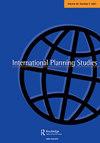Visionary cities or spaces of uncertainty? Satellite cities and new towns in emerging economies
IF 1.5
Q4 REGIONAL & URBAN PLANNING
引用次数: 27
Abstract
Satellite cities and new towns have recently captured urban imaginations of planners, property developers and politicians in the Global South and East, and are also emerging as a research topic in urban studies, planning and development studies. With emblematic names like Techno City, Eco City and Hope City they embody a new property investment frontier and an optimistic belief in economic growth driven by a rising middle class. This special issue critically explores the various manifestations anddimensions of satellite city andnew towndevelopment in emerging economies. These cities characterize contemporary processes of urban development. Planned on greenfield sites some distance away from the existent city and the problems associated with rapid urbanization, they provide planners and developers with the opportunity to develop semi-autonomous cities based on visionary urban designs. As status projects they represent a nationalist ideal and new belief in city-planning, often reflecting formsof social engineering andahistorical belief in the ability toplan for entire societies and economies. They intend to connect people, regions and sectors to the global economy, relying on branding strategies in order to attract foreign investors and to compete with other such cities elsewhere. Satellite cities and new towns are developed in settings of rapid economic and political transformation in ways that expose the limits to urban design. Their reliance on global circuits of capital and capital injections by international financial institutions such as the World Bank, marks their vulnerability to global economic conjunctures, in turn compromising their provision of privatized infrastructure and centralized master planning. Ordinary city development and its informal aspects infringe on these cities, acting as constant reminders of their problematic scope and ambition. As social and economic enclaves, they constitute sites of spatial exclusion that privilege certain types of economic activities and middle class demands. The tension between satellite cities and new towns as planned rationalities and sites of speculative urbanism on the one hand and cities as living organisms and sites of creative reworking and social differentiation on the other, marks them as nascent spaces in which a multiplicity of development trajectories and organizational rationalities converge. In recognition of the gap between planning and lived realities of the built environment and testimony to the globalized nature of expert networks, planners and officials employ contemporary discourses of inclusiveness and sustainable urbanism. The translation of contemporary planning, policy and/or management concepts such as sustainable urban planning, risk management, renewable energy, and public participation mark these cities as unique research sites where planning有远见的城市还是充满不确定性的空间?新兴经济体的卫星城市和新城
卫星城市和新城最近吸引了全球南部和东部规划者、房地产开发商和政治家的城市想象力,也成为城市研究、规划和发展研究的一个研究主题。他们以Techno City、Eco City和Hope City等象征性的名字,体现了一个新的房地产投资前沿,以及对中产阶级崛起推动经济增长的乐观信念。本期特刊批判性地探讨了新兴经济体卫星城和新城发展的各种表现形式和维度。这些城市是当代城市发展过程的特征。它们规划在距离现有城市一定距离的绿地上,以及与快速城市化相关的问题,为规划者和开发商提供了在富有远见的城市设计基础上发展半自治城市的机会。作为地位项目,它们代表了一种民族主义理想和对城市规划的新信念,通常反映了社会工程的形式和对整个社会和经济能力的历史信念。他们打算将人们、地区和部门与全球经济联系起来,依靠品牌战略来吸引外国投资者,并与其他地方的其他此类城市竞争。卫星城市和新城是在经济和政治快速转型的背景下发展起来的,其方式暴露了城市设计的局限性。它们依赖全球资本循环和世界银行等国际金融机构的注资,这标志着它们容易受到全球经济形势的影响,进而影响到它们提供私有化的基础设施和集中的总体规划。普通的城市发展及其非正式方面侵犯了这些城市,不断提醒人们注意它们存在问题的范围和雄心。作为社会和经济飞地,它们构成了空间排斥的场所,使某些类型的经济活动和中产阶级需求享有特权。卫星城和新城作为规划理性和投机城市主义的场所,而城市作为活的有机体和创造性改造和社会分化的场所,两者之间的紧张关系,标志着它们是多种发展轨迹和组织理性交汇的新生空间。为了认识到建筑环境的规划和生活现实之间的差距,并证明专家网络的全球化性质,规划者和官员采用了包容性和可持续城市化的当代话语。当代规划、政策和/或管理概念的转化,如可持续城市规划、风险管理、可再生能源和公众参与,标志着这些城市成为规划的独特研究场所
本文章由计算机程序翻译,如有差异,请以英文原文为准。
求助全文
约1分钟内获得全文
求助全文
来源期刊

International Planning Studies
REGIONAL & URBAN PLANNING-
CiteScore
4.60
自引率
4.80%
发文量
20
期刊介绍:
Planning, at urban, regional, national and international levels, faces new challenges, notably those related to the growth of globalisation as both an objective socio-economic process and a shift in policy-maker perceptions and modes of analysis. International Planning Studies (IPS) addresses these issues by publishing quality research in a variety of specific fields and from a range of theoretical and normative perspectives, which helps improve understanding of the actual and potential role of planning and planners in this context.
 求助内容:
求助内容: 应助结果提醒方式:
应助结果提醒方式:


